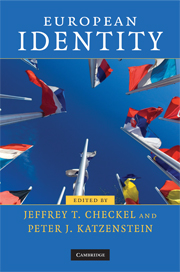Book contents
- Frontmatter
- Contents
- List of figures
- List of tables
- List of contributors
- Preface
- 1 The politicization of European identities
- Part I European identity as project
- Part II European identity as process
- Part III European identity in context
- 8 Identification with Europe and politicization of the EU since the 1980s
- 9 Conclusion – European identity in context
- Bibliography
- Index
9 - Conclusion – European identity in context
Published online by Cambridge University Press: 05 June 2012
- Frontmatter
- Contents
- List of figures
- List of tables
- List of contributors
- Preface
- 1 The politicization of European identities
- Part I European identity as project
- Part II European identity as process
- Part III European identity in context
- 8 Identification with Europe and politicization of the EU since the 1980s
- 9 Conclusion – European identity in context
- Bibliography
- Index
Summary
Europe's identities, this book argues, exist in the plural. There is no one European identity, just as there is no one Europe. These identities can be conceived as both social process and political project. Understood as process, identities flow through multiple networks and create new patterns of identification. Viewed as project, the construction of identities is the task of elites and entrepreneurs, operating in Brussels or various national settings.
Process and project involve publics and elites; they are shaped by and shape states; they are open-ended and have no preordained outcomes; and they serve both worthy and nefarious political objectives. Bureaucrats crafting a Europe centered on Brussels, xenophobic nationalists, cosmopolitan Europeanists, anti-globalization Euro-skeptics, and a European public that for decades has been permissive of the evolution of a European polity – they are all politically involved in the construction of an evolving European identity.
Following the 2004 and 2007 enlargements, a politically cohesive Western Europe centered on the European Union (EU) is receding, while a politically looser and more encompassing Europe is rising. Europe is no longer what it was during the Cold War, an integral part of an anti-communist alliance. In the wake of 9/11, for many in Western Europe, Europe now represents an alternative to American unilateralism and militarism. For Central and Eastern European states seeking to build their own democratic and capitalist futures, Europe has become both a place of return and an inescapable destination.
- Type
- Chapter
- Information
- European Identity , pp. 213 - 227Publisher: Cambridge University PressPrint publication year: 2009
- 10
- Cited by

